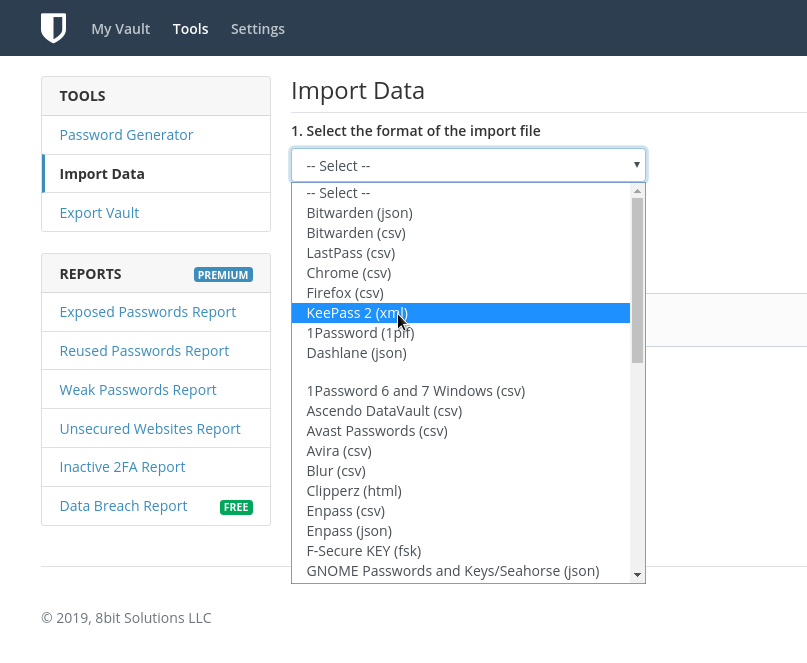Aug 30, 2020 Bitwarden, the open source password manager, makes it easy to generate and store unique passwords for any browser or device. Create your free account on the platform with end-to-end encryption and flexible integration options for you or your business. In this video on show you how to install Bitwarden on Docker while using a Nginx reverse Proxy.Commands:sudo docker run -d -name bitwarden -v /path/to/your/. My instance of bitwardenRS seemed to be working quite fine since 10/2020. I have been looking into using fail2ban as a security layer so I started following the guide on the bitwardenrs wiki to do that. A prerequisite is that I configure logging so I went in to my docker-compose.yml. Dmg dmu 80 p hi dynminew. This is my docker-compose.yml before starting to configure logging (I use nginx as a reverse proxy): docker. You will be # responsible for maintaining this config file. # Template: generatecomposeconfig: true # # Auto-generate the `./nginx/default.conf` file. # WARNING: Disabling generated config files can break future updates.
I use a self-hosted bitwarden-rs to manage my passwords, and it works greatexcept using docker to run it was using most of the RAM on my cheap VPS fromVultr. Since bitwarden-rs is just a rust program that uses around 16MB of RAM,it seemed overkill to have docker running around it using over 100MB.
I cloned the repository, checked out the latest tag and then ran
You can use postgresql or mysql if you want but sqlite suites my needs as a single user just fine.


You then need the web UI. Since this is nodejs it takes a lot of RAM to buildso I would recommend just getting the latest release from their web vaultreleases. The version I got was 2.12.0. Extract it to a folder web-fault.

I then setup what will be the app directory; I used /opt/bitwarden but you can use whatever you like.
Bitwarden Nginx Install
You will need to run the bitwarden_rs application, but systemd makes this veryeasy. I setup /etc/systemd/system/bitwarden.service Chris brown graffiti deluxe edition zip.
and then enabled and ran it with systemctl enable --now bitwarden.service
Then you just need to have a web server to run it, preferably with some SSLsupport. This is how my nginx configuration looks for it.
I made some extra conf files that all my domains source for nginx to easilymanage Let’s Encrypt and SSL settings, see my blog post about it.
Bitwarden Nginx Server
And now it should be done. Without a lot of effort you have saved yourself thehassle of running a docker container and are saving some precious memory.
How can you easily lock down proxy hosts on the Nginx Proxy Manager with Access List protection? I recently deployed many services in Docker containers that I’ve exposed via the Nginx Proxy Manager. But some of these services should not be accessible for everyone. Or you have specific applications that don’t have any user authentication and you want not everyone to access them. With a simple Access List in Nginx Proxy Manager, you can define a custom policy based on credentials or IP addresses. Let’s have a look at how that works.
Raspberry Pi Bitwarden
Access List
An Access List, also sometimes referred to as “ACL” in IT is a prefined list of access rules. This is very useful for any administrative application such as Portainer, Bitwarden, or the Nginx Proxy Manager web interface itself. It’s also useful to lock down access to applications that are vulnerable themselves. In Nginx Proxy Manager you can create a new Access List and select them in any proxy hosts.
Note, currently in Nginx Proxy Manager, if you change anything in an Access List that is already present in a proxy host, you need to save the proxy host object again! This took me quite a while to figure out and probably is something that should be improved in a future version of the Nginx Proxy Manager.
Access based on User
Bitwarden Nginx Proxy Manager
In the “Authorization” tab you can enter usernames and passwords to authenticate users to your application or service. This is very easy and self-explained. Unfortunately, it’s limited to 5 users max. But one cool feature is, that you can also forward this authentication to the real server with the “Pass Auth to Host” flag. This will send out an HTTP Basic Auth packet.
Access based on IP Address
You can also define up to 4 rules based on IP Addresses. You can select if you want to specifically allow IP addresses or block them. They are applied in the order they are defined, so when there is a match all other rules below are ignored. It’s important to mention that you can not just enter a single IP address, but also networks. So in this example, I’ve blocked the network 192.168.0.0/24 completely. That means all IP addresses from 192.168.0.1 till 192.168.0.254 are allowed to connect via this Access List.
Bitwarden Rs Docker Compose

Combination and ruleset
How does it work when you combine an Authorization via credentials and an Access list by IP addresses? If you enable the “Satisfy Any” checkbox in the main tab, that means that either the authorization or the IP addresses need to match, but not both. If you disable it, both need to match to validate access to the proxy host. This can be very useful if you have some IP addresses that may be valid to access an application, but this is not secured by password authentication.
